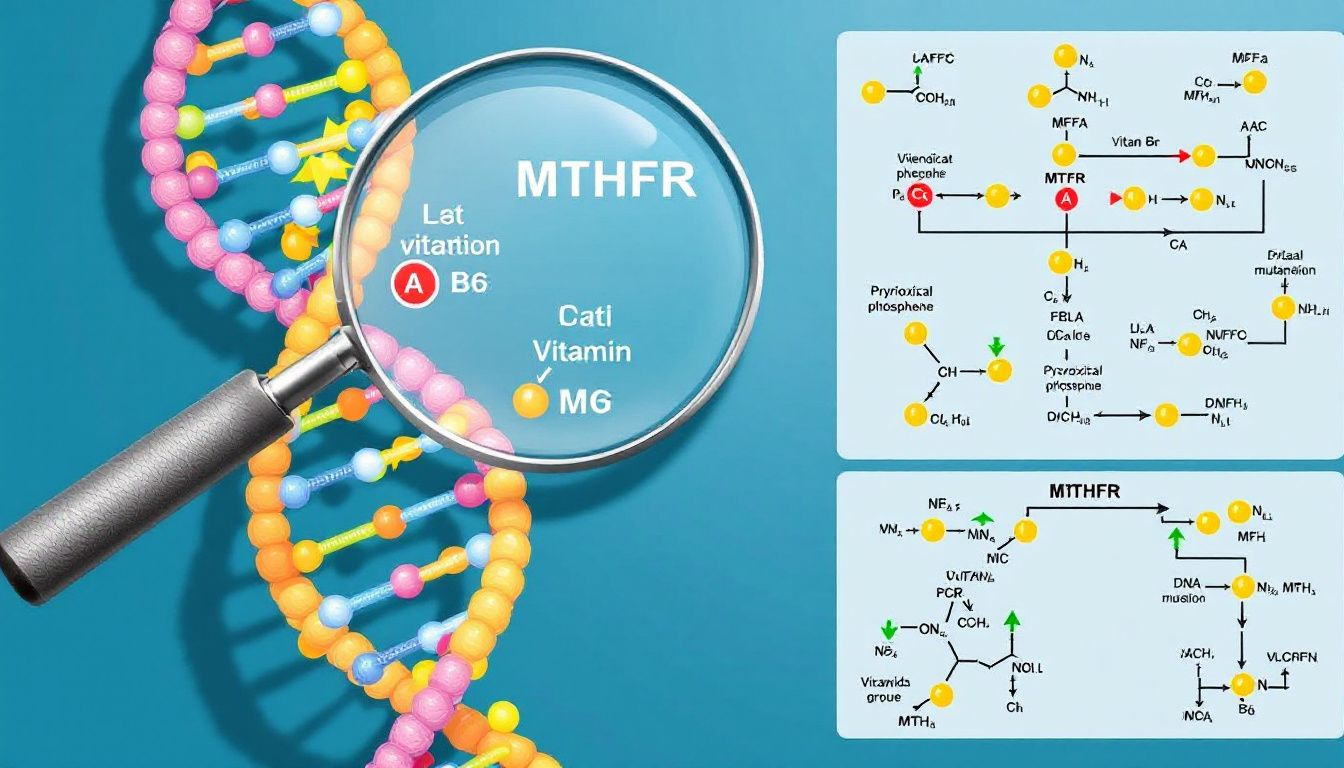How does an MTHFR gene mutation impact vitamin B6 metabolism? If you have this genetic mutation, it’s critical to understand how it can affect your health. This article will explain the connection between the MTHFR gene mutation and vitamin B6, specifically focusing on the MTHFR gene mutation vitamin B6, what risks may arise, and how to manage them effectively.
Key Takeaways
The MTHFR gene is essential for converting folate into its active form and maintaining healthy homocysteine levels, with mutations like C677T potentially leading to increased cardiovascular risks.
Vitamin B6 plays a crucial role in various metabolic processes, including neurotransmitter synthesis and immune function, with specific daily intake recommendations varying by age and condition.
Understanding the interaction between MTHFR mutations and vitamin B6 metabolism is key to developing personalized treatment plans that optimize nutrient levels and mitigate health risks.
Understanding the MTHFR Gene

The MTHFR gene is a cornerstone in the complex web of our body’s biochemistry, particularly in folate and homocysteine metabolism. This gene is responsible for converting 5,10-methylenetetrahydrofolate to 5-methyltetrahydrofolate, a critical process in remethylating homocysteine to methionine. Methionine, in turn, is vital for numerous bodily functions, including DNA synthesis and cardiovascular health. Without the proper function of the MTHFR gene, our bodies struggle to maintain healthy levels of homocysteine, an amino acid whose excess can spell trouble for our health.
A malfunctioning MTHFR gene can raise homocysteine levels, increasing risks to cardiovascular health and overall well-being. A deeper understanding of this gene and its functions can illuminate the reasons behind certain health issues and guide us towards more effective treatments and preventive measures.
MTHFR Enzyme Function
The MTHFR enzyme is crucial for producing 5-methyltetrahydrofolate, the primary form of folate. It converts dietary folate into its active form, essential for various metabolic processes, including folate metabolism, DNA synthesis, and methylation, which are fundamental to cell division, gene expression, and the metabolic pathway. Additionally, methylenetetrahydrofolate reductase plays a significant role in this process.
The MTHFR enzyme also plays a significant role in one-carbon metabolism, which includes the remethylation of homocysteine to methionine. This process is essential for producing methionine and maintaining balanced homocysteine levels, preventing various health issues.
Common MTHFR Mutations
One of the most common MTHFR gene mutations is the C677T variant, affecting approximately 30-50% of certain populations. This mutation results in a thermolabile enzyme with reduced activity, making it less effective in converting 5,10-methylenetetrahydrofolate to 5-methyltetrahydrofolate. Another prevalent mutation is the A1298C variant, which can also lead to altered enzyme activity and increased health risks.
Such mutations can impair the body’s ability to process folate and keep homocysteine levels normal. Depending on the specific mutation, individuals may face health issues ranging from mild hyperhomocysteinemia to more severe conditions.
Vitamin B6 and Its Role in the Body

Vitamin B6 is a powerhouse nutrient, playing a critical role in amino acid metabolism, neurotransmitter synthesis, and immune function. This water-soluble vitamin is found in several forms in our diet, including pyridoxine, pyridoxamine, and pyridoxal, which are metabolized in the liver to its active form, pyridoxal 5’-phosphate (PLP). The active form, PLP, acts as a coenzyme in over 140 enzyme reactions, essential for metabolizing amino acids, glucose, and lipids.
Vitamin B6 is also essential for synthesizing neurotransmitters like serotonin, crucial for nervous system communication. Its broad range of functions underscores the need to maintain adequate levels for overall health and well-being.
Active Form: Pyridoxal 5′-Phosphate (PLP)
Pyridoxal 5’-phosphate (PLP), the active form of vitamin B6, is indispensable for numerous biochemical processes. As a co-factor, PLP facilitates various enzymatic reactions, particularly those involved in amino acid metabolism. This active form is crucial for maintaining metabolic functions and supporting the body’s overall biochemical balance.
PLP also aids in synthesizing neurotransmitters like serotonin and dopamine, vital for mood regulation and cognitive function. Adequate PLP levels support these critical processes, promoting better mental and physical health.
Recommended Daily Intake
Before:
The National Institutes of Health recommend a daily intake of 1.3 mg of vitamin B6 for adults up to the age of 50. For pregnant women, the recommended intake increases to 1.9 mg per day to support fetal development, while breastfeeding mothers should aim for 2.0 mg daily to ensure optimal infant nutrition. These guidelines highlight the importance of maintaining adequate vitamin B6 levels through a balanced diet or supplementation.
After:
The National Institutes of Health recommend the following daily intake of vitamin B6:
1.3 mg for adults up to the age of 50
1.9 mg for pregnant women to support fetal development
2.0 mg for breastfeeding mothers to ensure optimal infant nutrition
These guidelines highlight the importance of maintaining adequate vitamin B6 levels through a balanced diet or supplementation.
Consuming vitamin B6-rich foods, such as poultry, fish, potatoes, and bananas, can help meet these daily requirements. For individuals with specific health conditions, such as MTHFR mutations, tailored dietary plans may be necessary to ensure they receive the right amounts of this essential vitamin.
Interaction Between MTHFR Mutations and Vitamin B6

The interplay between MTHFR mutations and vitamin B6 metabolism is a critical aspect of understanding how genetic variations can impact health. MTHFR variants can disrupt the conversion of vitamin B6 to its active form, PLP, thereby affecting its availability for essential biochemical processes. This disruption can lead to elevated homocysteine levels, a risk factor for numerous health issues, including cardiovascular diseases.
Grasping this interaction helps individuals with MTHFR mutations manage their health effectively. Genetic testing can pinpoint specific mutations, enabling personalized treatment plans to optimize vitamin B6 metabolism and reduce health risks.
Impact on Homocysteine Levels
MTHFR mutations, such as the common C677T variant, can significantly impair the conversion of homocysteine to methionine, leading to elevated homocysteine levels in the bloodstream. This reduction in enzyme activity, often to about 65% in those with the C677T variant, hampers the body’s ability to process homocysteine effectively. Elevated homocysteine is a recognized independent risk factor for cardiovascular diseases, emphasizing the importance of managing these levels for overall health.
Genetic studies confirm a significant link between the MTHFR gene and plasma homocysteine levels. Dietary and lifestyle modifications can help mitigate health risks associated with high homocysteine.
Influence on Cognitive Health
Disruptions in vitamin B6 metabolism due to MTHFR mutations can have profound effects on cognitive health. Elevated homocysteine levels and insufficient PLP can contribute to mood disorders such as depression and anxiety.
Moreover, these disruptions are linked to an increased risk of cognitive decline and dementia, underscoring the critical need for proper management of vitamin B6 levels in individuals with MTHFR mutations.
Symptoms and Risks Associated with MTHFR Mutations

Mutations in the MTHFR gene can lead to a host of symptoms and health risks due to reduced enzyme activity. These genetic variations can cause elevated homocysteine levels, which in turn increase the risk of cardiovascular diseases and other health issues. Individuals with MTHFR mutations may experience a range of symptoms, from mild to severe, depending on the specific mutation and its impact on enzyme function.
B vitamin deficiencies, often linked to MTHFR mutations, can exacerbate these health risks. Deficiencies in vitamins B6, B12, and folate can lead to neurological problems, cognitive impairments, and mood disorders. Understanding these risks is crucial for managing health and preventing chronic conditions associated with MTHFR mutations.
Neurological Symptoms
Vitamin B6 deficiency, often exacerbated by MTHFR mutations, can lead to significant neurological issues. Symptoms such as cognitive dysfunction, peripheral neuropathy, and mood disorders like depression and anxiety are common among individuals with disrupted vitamin B6 metabolism. Elevated homocysteine levels further contribute to these neurological symptoms, increasing the risk of cognitive decline and dementia.
Targeted supplementation and dietary changes can alleviate these symptoms and enhance overall neurological health.
Cardiovascular Disease Risk
High homocysteine levels, often linked to MTHFR mutations, are a significant risk factor for cardiovascular diseases. Elevated homocysteine can damage blood vessel walls, increasing the susceptibility to heart disease and other cardiovascular conditions. Individuals with MTHFR mutations must be vigilant in managing their homocysteine levels to reduce these risks.
B vitamin deficiencies can exacerbate this risk by further increasing homocysteine production and decreasing its catabolism. Adequate intake of vitamins B6, B12, and folate through diet and supplementation is essential for cardiovascular health.
Managing MTHFR-Related Health Issues

Managing health issues from MTHFR mutations requires a multifaceted approach. Individuals may need tailored strategies to maintain optimal levels of vitamin B6 and other essential nutrients. Prioritizing nutrients that support methylation, especially B vitamins like B6, B12, and folate, is key to managing symptoms and risks.
Effective management includes dietary recommendations, supplementation guidelines, and lifestyle modifications to support overall health and well-being.
Dietary Recommendations
Vitamin B6 is essential for amino acid metabolism, neurotransmitter synthesis, and immune function, making it particularly important for individuals with MTHFR mutations. Foods high in vitamin B6, such as poultry, fish, potatoes, chickpeas, and bananas, should be included in the diet to support these functions. Dark leafy greens, legumes, and certain animal products can also boost levels of essential B vitamins.
Pregnant women with MTHFR mutations should aim for a higher daily intake of vitamin B6, set at 1.9 mg, to support fetal development. Tailored treatment plans based on MTHFR test results may include dietary changes and targeted supplementation to regulate folate and homocysteine levels.
Supplementation Guidelines
The dosage for vitamin B6 supplements varies based on individual health conditions and should be discussed with a healthcare provider. Monitoring is crucial to avoid sensory neuropathy, especially at doses over 1000 mg per day. Riboflavin status can influence the effectiveness of B6 supplements, highlighting the need for balanced intake of both.
Using the active form of vitamin B6, pyridoxal-5-phosphate (P5P), can enhance its effectiveness, as it plays a crucial role in over 150 enzymatic reactions within the body.
Lifestyle Modifications
Lifestyle modifications are crucial in managing MTHFR-related health issues. Stress management techniques, such as mindfulness and relaxation exercises, significantly improve health outcomes. Strategies like meditation and journaling can also be beneficial.
An anti-inflammatory diet, like the Mediterranean diet, supports overall health and reduces risks associated with MTHFR mutations. Personalized plans with dietary changes and detoxification strategies further help manage symptoms and improve quality of life.
Understanding one’s genetic predisposition through testing can facilitate the development of targeted lifestyle changes that promote better health outcomes.
Genetic Testing and Personalized Medicine
Genetic testing is a powerful tool for uncovering the presence of common MTHFR mutations, such as C677T and A1298C, which can significantly impact an individual’s health. By identifying specific MTHFR mutations through genetic testing, healthcare providers can tailor treatment plans that are better suited to individual metabolic needs. This personalized approach ensures that interventions are more effective and can prevent the onset of related health issues.
Genetic testing enhances understanding of MTHFR-related health issues and enables personalized medical approaches to optimize care. Treatment options may include targeted supplementation with vitamin B6 and other B vitamins, dietary adjustments, and lifestyle changes based on individual mutation patterns.
Benefits of Genetic Testing
Genetic testing for MTHFR can reveal an individual’s predisposition to elevated homocysteine levels and folate deficiency-related health issues. Identifying MTHFR mutations through genetic testing allows individuals to understand their risks for associated health conditions. Testing can help determine specific MTHFR gene variations, such as C677T and A1298C, which influence enzyme activity affecting health.
Armed with this knowledge, individuals can make informed decisions about their health and implement targeted strategies to mitigate risks. This proactive approach can significantly enhance quality of life and prevent the development of chronic conditions linked to MTHFR mutations.
Personalized Treatment Plans
Personalized treatment plans can optimize patients’ folate and homocysteine levels based on their specific genetic profiles. By tailoring supplementation and dietary recommendations to an individual’s genetic makeup, healthcare providers can ensure that patients receive the right nutrients in the right amounts. This precision in treatment not only improves health outcomes but also helps in preventing the adverse effects of improper nutrient levels.
For instance, individuals with specific MTHFR mutations might benefit more from taking supplements in their active forms, such as methyl-folate and pyridoxal-5-phosphate (P5P), rather than their inactive counterparts. This approach ensures that the body efficiently utilizes these nutrients, supporting overall health and well-being.
Summary
Understanding the MTHFR gene and its impact on vitamin B6 metabolism is crucial for optimizing health and preventing chronic diseases. The MTHFR gene plays a vital role in folate and homocysteine metabolism, and mutations in this gene can disrupt these processes, leading to a variety of health issues. By addressing these genetic variations through dietary changes, supplementation, and lifestyle modifications, individuals can significantly improve their health outcomes.
Genetic testing and personalized medicine offer powerful tools for identifying MTHFR mutations and tailoring treatment plans to individual needs. By leveraging these advancements, we can unlock the secrets to better health and well-being, paving the way for a healthier, more vibrant future.
Frequently Asked Questions
What is the MTHFR gene?
The MTHFR gene plays a vital role in regulating folate and homocysteine metabolism, facilitating the conversion of 5,10-methylenetetrahydrofolate to 5-methyltetrahydrofolate, which is essential for remethylating homocysteine to methionine. Understanding its function is important for comprehending various health implications associated with folate metabolism.
How do MTHFR mutations affect health?
MTHFR mutations can significantly impact health by impairing enzyme activity, which may result in elevated homocysteine levels and a heightened risk of cardiovascular diseases, cognitive impairments, and mood disorders. Therefore, individuals with these mutations should be aware of potential health implications.
What are the common MTHFR mutations?
The common MTHFR mutations are C677T and A1298C, which can affect enzyme activity and overall health. Understanding these mutations is essential for managing potential health implications.
How can I manage health issues related to MTHFR mutations?
You can effectively manage health issues related to MTHFR mutations through tailored dietary changes, targeted supplementation, and lifestyle modifications to ensure optimal nutrient levels. It is essential to consult with a healthcare professional for personalized guidance.
What are the benefits of genetic testing for MTHFR mutations?
Genetic testing for MTHFR mutations provides valuable insights into an individual’s risk for elevated homocysteine levels and associated health issues, enabling tailored treatment strategies for improved health outcomes. This proactive approach ensures that individuals can manage potential deficiencies effectively.

